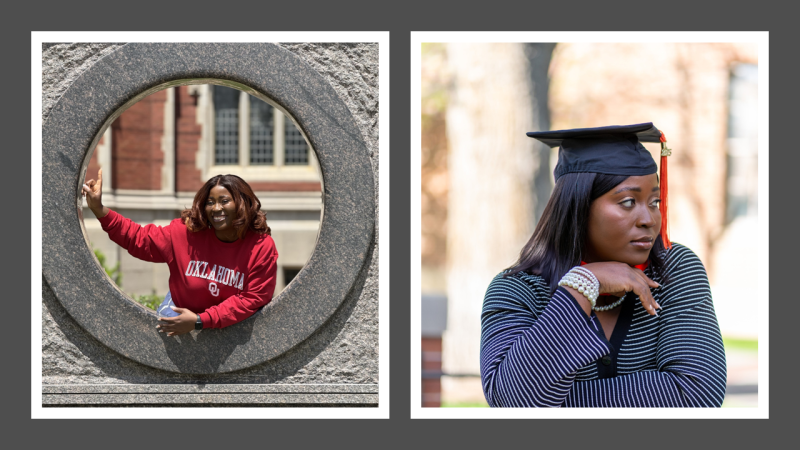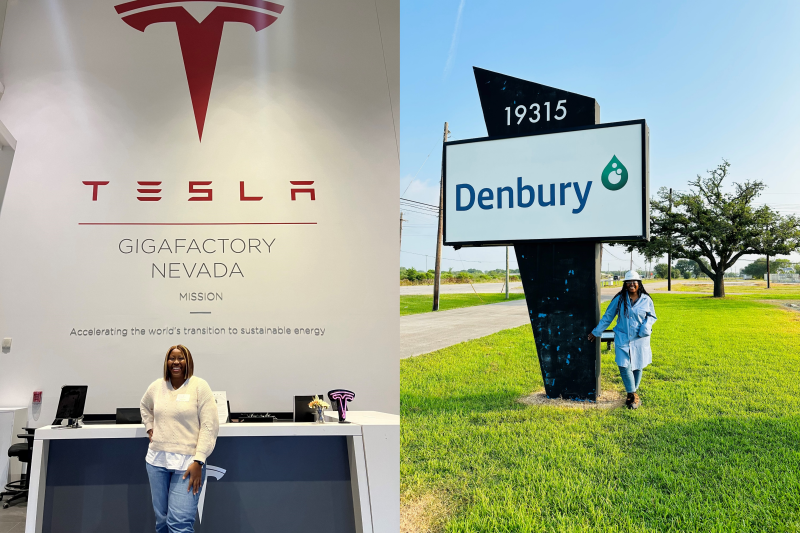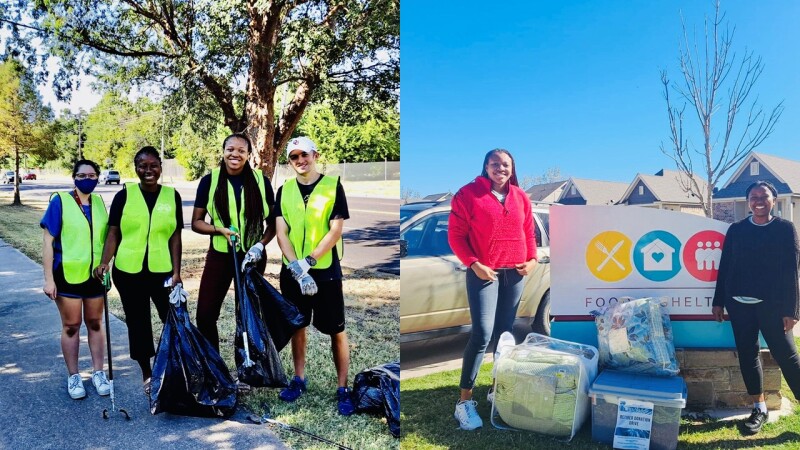On 9 May 2025, as I finally walked across the stage at the University of Oklahoma’s graduation ceremony to receive my master’s degree in data science and analytics, a full year after my official graduation, I felt an overwhelming sense of triumph. Exactly 1 week later, I walked yet another graduation stage at the University of Tulsa (TU), celebrating my master's in geoscience. These two ceremonies represented pivotal victories in a journey where, since beginning graduate school in August 2021, I'd nearly given up hope of completing either degree, let alone both.

My name is Emuobosa Patience Ojoboh, and I am a current PhD student in petroleum engineering at TU, having pursued a uniquely challenging academic trajectory that began with my roots in Nigeria’s Niger Delta, a region whose deep ties to oil and gas inspired my early passion for geology and sustainable energy production.
My goal in sharing this story is to inspire others navigating nonlinear journeys, emphasizing that we each deserve as many chances as we need to succeed. Through every challenge and unexpected turn, SPE has been my constant, a foundation for mentorship, community, inspiration, and professional growth, even before leaving Nigeria for graduate school abroad.
Early Beginnings and Passion Discovery
My interest in geology and petroleum was deeply influenced by growing up in Nigeria’s Niger Delta, particularly in Delta State, where oil and gas shaped daily life, leading me to pursue geology at Delta State University. Driven by determination, I graduated top of my class in 2018, further enriched by my undergraduate research on aquifer susceptibility, which I successfully published in SPE's OnePetro, along with valuable internship experience at Shell Exploration and Production and active involvement in SPE events such as the Nigeria Annual International Conference and Exhibition and the Students Technical Conference and Exhibition.
After graduation, I completed Nigeria’s mandatory National Youth Service Corps with Oasis Corporate Systems in Lagos, staying on afterward as a business development and tendering engineer and later briefly transitioning into commercial banking during the COVID-19 pandemic. Despite these career diversions, my original goal remained clear: to pursue a master's in geology at the University of Oklahoma (OU), with a structured 2-year program requiring at least 30 graduate credit hours, high academic performance, and completion of a research thesis. However, as my journey would later show, life often leads us down paths we never could have imagined, proving dreams sometimes unfold very differently than we initially planned.
Unexpected Challenges and an Academic Pivot
When I arrived at the OU in 2021 to pursue a thesis-based master’s degree in geology, I could not have anticipated the challenges ahead. As data science and analytics were rapidly gaining importance in the energy industry, I decided to enroll in a few courses and eventually pursued a dual master’s program in geology and data science and analytics. While I met the coursework requirements for both degrees, I did not meet the required research thesis credits, which, under the conditions of the dual degree, meant I could not graduate with either program. At the same time, I was also dealing with illness that contributed to the struggle.
With the support of the graduate school, I was able to separate the programs, complete the data science and analytics degree, and begin searching for opportunities to continue my geoscience studies. This period was emotionally difficult—I often felt like a failure or even a fraud—yet it taught me one of the most important lessons of my life: Setbacks may be inevitable, but resilience, adaptability, and the belief that I deserved another chance allowed me to keep moving forward and ultimately succeed.
The Transfer That Saved My Degree
Transferring to TU became the turning point that saved my academic journey when I faced the possibility of leaving Oklahoma without a master’s degree in geology. Determined not to give up, I began reaching out to other programs and was fortunate to connect with a professor at TU who believed in me and offered admission with funding to complete a thesis-based master’s degree in geoscience.
The transition tested every ounce of my resilience; I had to rebuild confidence while starting over in a new academic environment. Yet it also opened doors to positive outcomes. I completed my thesis research and presented initial results at the SPE Gulf Coast Section Data Science Convention, where I was honored as the second runner-up in the poster presentation competition.

This experience taught me that perseverance in the face of setbacks can transform near-failure into a new foundation for success and that, sometimes, the second chance we fight for becomes the most defining part of our journey.
Industry Experiences Bridging Traditional and New Energy
Beyond academia, my professional experiences also shaped my journey and broadened my perspective on the evolving energy landscape. In the summer of 2023, while still pursuing my dual master’s at the OU, I interned at Denbury (now ExxonMobil), where I worked on enhanced oil recovery techniques. It was an incredible experience with supportive mentors and teammates, allowing me to apply my geological and data analysis skills to reservoir characterization, fracture network modeling, and fluid-flow prediction using tools such as Petrel and Python.
The following spring, I transitioned into a very different role at Tesla, serving as a geology and mining intern on the lithium exploration team in Reno, Nevada, where I conducted geological mapping and core sample analysis and integrated remote sensing with subsurface modeling to reduce uncertainty in resource evaluation.

While these opportunities came from opposite ends of the energy spectrum—traditional petroleum and renewable-focused lithium exploration—they complemented each other by expanding my technical range and reinforcing the transferability of core skills across disciplines. Most importantly, they taught me the value of flexibility and openness to opportunities outside traditional paths, a lesson that continues to shape how I approach my career in an evolving energy industry.
SPE As My Anchor Through Uncertainty
I often call myself a serial volunteer, and it was SPE that first introduced me to the joy of giving back. Before SPE, I thought one needed to have so much before they could contribute; but, through its platforms, I learned that volunteering, whether in technical or nontechnical ways, was about impact, consistency, and community.

Over the years, I have been honored with recognition, such as the 2018 SPE Lagos Section Outstanding Young Professional Service Award, 2022 Lagos Section Service Award for serving on the section’s board, and most recently, my success at the SPE-GCS Data Science Convention in 2025.
Beyond awards, SPE has been my constant anchor. It provided mentors who supported me through my entire professional and academic journeys, peers who became some of my closest friends, and opportunities to showcase my skills in ways that reaffirmed my worth when my academic path felt uncertain. Most importantly, SPE reminded me that we all deserve as many chances as we need to succeed, because sometimes community is the very chance that keeps us going when everything else feels uncertain.
Starting My PhD: A Testament to Persistence
This fall, I begin my PhD in petroleum engineering at TU, a step I once thought might never be possible. My transition years, though marked by challenges, became a season of profound learning, where completing both master’s degrees and successfully defending a thesis restored my confidence in my competence and reminded me how much I love research, problem-solving, and contributing to the energy industry. Those earlier setbacks also prepared me for the rigor of doctoral study. I now understand that failure is not the end but often the beginning of a new strategy and that persistence is the true measure of success.
My immediate goals are to settle into my coursework, secure a summer 2026 internship, begin shaping my research structure, and grow as both a researcher and a leader through teaching assistant responsibilities. Above all, this new chapter stands as proof that perseverance and adaptability can transform obstacles into opportunities, and it reinforces the belief that has carried me all along: We deserve as many chances as we need to succeed.
A Message to Fellow Students and Young Professionals
To every student and young professional reading this, especially those facing uncertainty, I want you to know that setbacks are not the end. They are opportunities in disguise. There were countless moments in my journey when it felt like everything was falling apart, but every detour brought growth, resilience, and a clearer sense of purpose. Adaptability and openness to change are not just survival skills in this industry, they are the very tools that will shape your path forward.
Surround yourself with a strong community. I cannot emphasize enough how much SPE has been that for me, providing mentorship, friendship, and a platform to grow both technically and personally. Remember this: Unconventional journeys often yield the most meaningful outcomes, and yours is no less valid simply because it looks different.
Looking Forward
Looking back, my story has been defined by resilience, adaptability, and the unwavering support of SPE, which kept me grounded through the hardest seasons of graduate school. Looking forward, my vision is to excel in my PhD research in petroleum engineering, secure opportunities to bridge innovation with industry needs, and continue developing as both a researcher and a leader.
Just as SPE gave me a platform, I am committed to giving back to the organization, to my peers, and to the next generation of students who one day will walk their own nonlinear paths. Above all, never forget: Your dreams are valid. Failure is inevitable, but you must keep on keeping on, because we all deserve as many chances as we need to succeed.


